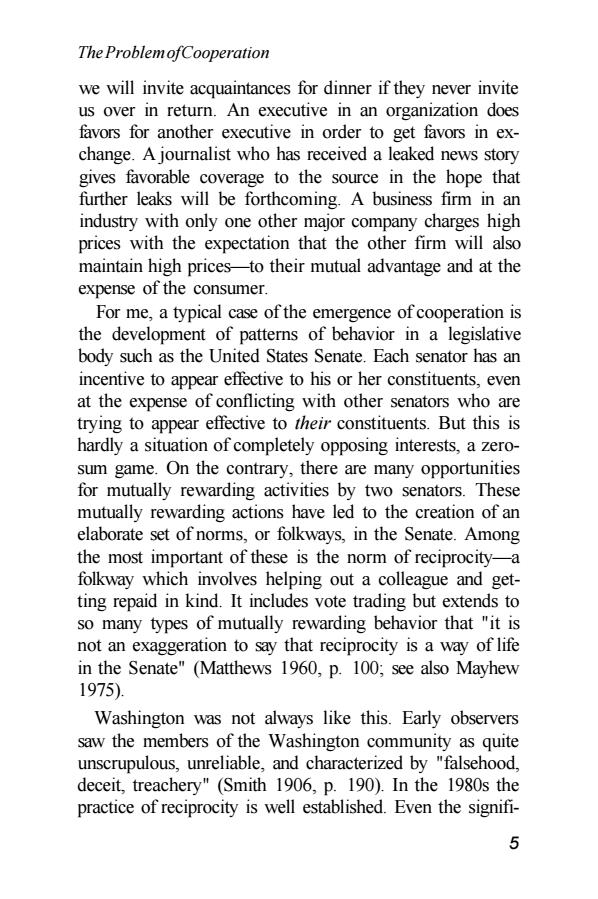正在加载图片...

The Problem ofCooperation we will invite acquaintances for dinner if they never invite us over in return.An executive in an organization does favors for another executive in order to get favors in ex- change.A journalist who has received a leaked news story gives favorable coverage to the source in the hope that further leaks will be forthcoming.A business firm in an industry with only one other major company charges high prices with the expectation that the other firm will also maintain high prices-to their mutual advantage and at the expense of the consumer. For me,a typical case of the emergence of cooperation is the development of patterns of behavior in a legislative body such as the United States Senate.Each senator has an incentive to appear effective to his or her constituents,even at the expense of conflicting with other senators who are trying to appear effective to their constituents.But this is hardly a situation of completely opposing interests,a zero- sum game.On the contrary,there are many opportunities for mutually rewarding activities by two senators.These mutually rewarding actions have led to the creation of an elaborate set of norms,or folkways,in the Senate.Among the most important of these is the norm of reciprocity-a folkway which involves helping out a colleague and get- ting repaid in kind.It includes vote trading but extends to so many types of mutually rewarding behavior that "it is not an exaggeration to say that reciprocity is a way of life in the Senate"(Matthews 1960,p.100;see also Mayhew 1975). Washington was not always like this.Early observers saw the members of the Washington community as quite unscrupulous,unreliable,and characterized by "falsehood. deceit,treachery"(Smith 1906,p.190).In the 1980s the practice of reciprocity is well established.Even the signifi- 5The Problem of Cooperation we will invite acquaintances for dinner if they never invite us over in return. An executive in an organization does favors for another executive in order to get favors in exchange. A journalist who has received a leaked news story gives favorable coverage to the source in the hope that further leaks will be forthcoming. A business firm in an industry with only one other major company charges high prices with the expectation that the other firm will also maintain high prices—to their mutual advantage and at the expense of the consumer. For me, a typical case of the emergence of cooperation is the development of patterns of behavior in a legislative body such as the United States Senate. Each senator has an incentive to appear effective to his or her constituents, even at the expense of conflicting with other senators who are trying to appear effective to their constituents. But this is hardly a situation of completely opposing interests, a zerosum game. On the contrary, there are many opportunities for mutually rewarding activities by two senators. These mutually rewarding actions have led to the creation of an elaborate set of norms, or folkways, in the Senate. Among the most important of these is the norm of reciprocity—a folkway which involves helping out a colleague and getting repaid in kind. It includes vote trading but extends to so many types of mutually rewarding behavior that "it is not an exaggeration to say that reciprocity is a way of life in the Senate" (Matthews 1960, p. 100; see also Mayhew 1975). Washington was not always like this. Early observers saw the members of the Washington community as quite unscrupulous, unreliable, and characterized by "falsehood, deceit, treachery" (Smith 1906, p. 190). In the 1980s the practice of reciprocity is well established. Even the signifi- 5